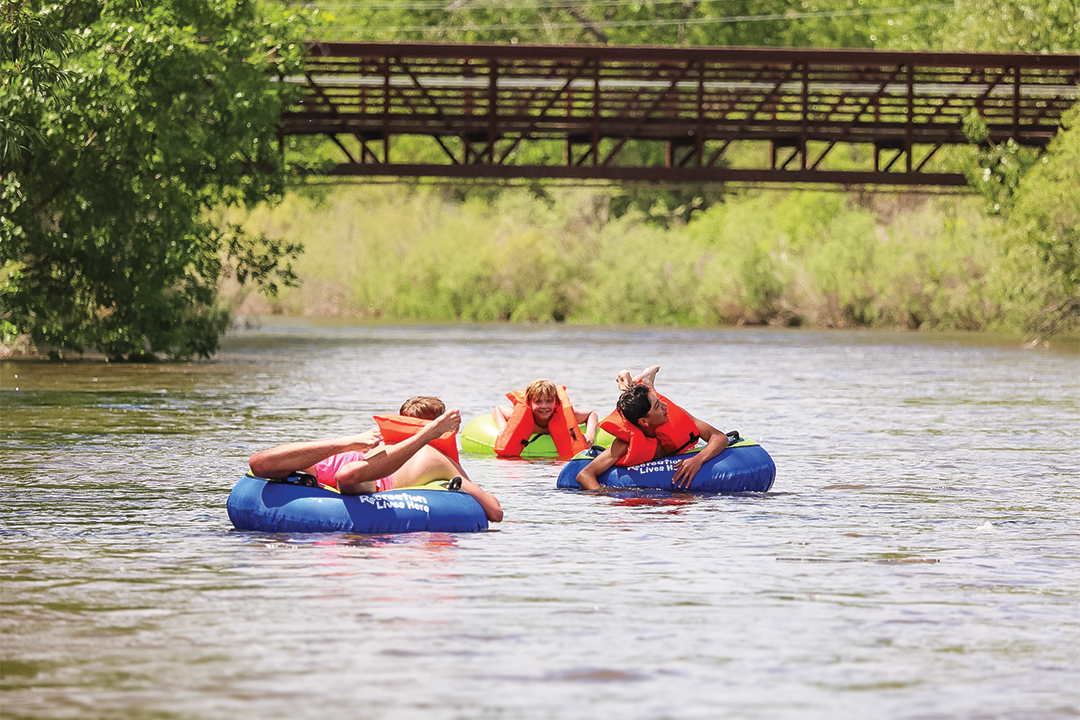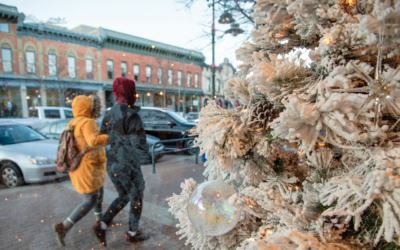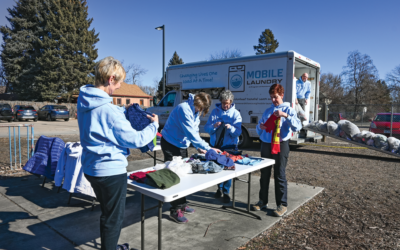As far back as the 1970s, the City of Fort Collins wanted to do something with the section of the Cache la Poudre River that flowed through downtown. Or, at the very least, they wanted to stop abusing it.
“The community was like, ‘We’ve got to do something,’” says Matt Day, senior landscape architect for the city’s park planning and development department. “It was literally a landfill as it ran through town.”
It seems hard to believe when you look at what Fort Collins and Windsor have done with their sections of the Poudre in the last few years, but Fort Collins once treated the river as something to be tamed and trashed, not cherished. The city hemmed it in with concrete, and companies dumped trash into it. Parents told their kids to stay away. Teenagers drank there. And yet, Day heard that people wanted more for it.
It took decades of planning, but Fort Collins did do something with the river in the form of the 11-acre Poudre River Whitewater Park that opened over four years ago. Fort Collins allowed the Poudre to be a wild river again, like many of the other 30-plus rivers across Colorado, and spent millions of dollars and just as many labor hours to restore it.
There’s some whitewater, even a big wave that can get a bit unruly for tubers depending on the time of year and how fast the river is flowing. There are also plenty of places for people who would rather look at the river than ride it.
Both Fort Collins and Windsor see the river as more than a place to splash around. Their work welcomes the Poudre back with the fanfare of a royal visitor and lavishes it with the kind of attention a main tourist attraction normally receives. Instead of sweeping it under the rug, they now invite residents and visitors to enjoy it.
In Fort Collins, people fish as well as float, and many like to sit by the river for lunch. Firefighters use the Poudre River Whitewater Park to train for river rescues, commercial rafting groups train new boaters on it and churches have even used the spot for sunrise services.
“The whitewater is the reason it’s there, but it has so much more use than just whitewater,” Day says. “We were trying to make it a park-like space. There’s not a day that you don’t have a different user out there. One day it’s flowing where people can tube, and then the river drops and the anglers are out the next day. It doesn’t miss a beat.”
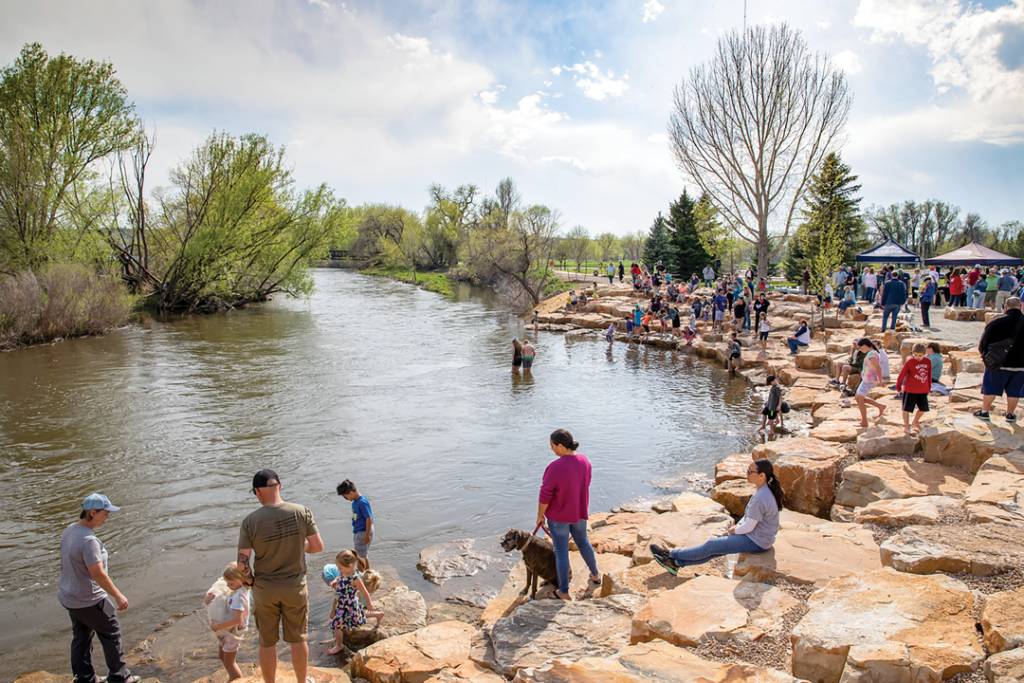
Eastman Park River Experience, Windsor
A calmer kind of fun
Windsor had the same idea as Fort Collins to use the river as a recreational tool, but the concepts are decidedly different. Windsor calls their section the Eastman Park River Experience. Note that the title says nothing about whitewater.
“It’s really supposed to be more of a lazy river,” says Eric Lucas, who was named Windsor’s first deputy city manager in April after working as the town’s public services director.
When Lucas joined Windsor’s city staff back in 2015, he wondered why they weren’t doing more with the Poudre. By that time, at least two dozen other Colorado cities had used their nearby rivers to their advantage, including Estes Park, which has the Big Thompson River flowing through its downtown. Another example is Golden, which packs in crowds of people on summer weekends at its Clear Creek Whitewater Park, bringing customers to the town’s coffee shops, restaurants and small tube rental companies.
As a result, Colorado has more man-made whitewater features than any other state in the country, says Nik White, access and conservation director at Colorado Whitewater and owner of Whitewater Workshop, a company that teaches whitewater paddling and safety in Golden. The crowds, at times, make it difficult for him to operate his business: He has a hard time using Clear Creek to teach his classes because it’s so busy, but he also prefers people using the rivers instead of ignoring them.
“The more we get people out on rivers, the more they become advocates of them,” White says.
In 2019, Windsor residents listed access to the Poudre as one of their top requests in a survey. Residents, as it turns out, were asking the same question as Lucas: Why wasn’t Windsor doing more with the Poudre? At that point, Lucas says, the town went “full force” into the idea.
Phase one of the project cost $1.6 million and opened three years ago, featuring a mile-long float as well as a river plaza where you can hang out, splash a bit and put your feet in the water.
There is no cost to float on the river, though the town will rent you a tube for $5 and offers an additional golf cart valet service where someone will drive you back to the start. Last year the town rented out 2,100 tubes during the summer season, an especially high number given that the attraction was closed for 30 days due to high water.
Since the river itself is not man-made, the Poudre flows at the whims of Mother Nature. Windsor will “close” the park, which really means it won’t offer rentals, when it gets to 1,700 cubic feet per second.
“You can still get in it,” Lucas says, “but we advise against it.”
The river can be difficult to get out of at those speeds, Lucas says, and a one-mile trip that can take 45 minutes to float may only take 15. The river typically reaches those speeds during the summer snowmelt, which generally peaks in June. The river shouldn’t run nearly that fast in July. If you’re wondering, the town lists the days the park is closed on its website.
Windsor will finish phase two of the project, a $4.6 million expansion, by October. The Northern Integrated Supply Project will cover half of that cost for wetland mitigation, Lucas says. The town will add south river access at Eastman Park as well as trails, garden space, a nature playground and even more parking improvements.
One of the highlights of the expansion is relocating the so-called “fast track” trail used by bikers on the Poudre River Trail next to the Treasure Island Demonstration Garden. Right now, there’s an occasional conflict as bikers whiz by residents who like to stop and look at the garden.
Windsor has already shared conceptual plans for a third stage of the experience, although construction is years away. For now, residents are enjoying the adventure park simply by allowing the river to be itself.
“It’s changed the face of the park,” Lucas says.
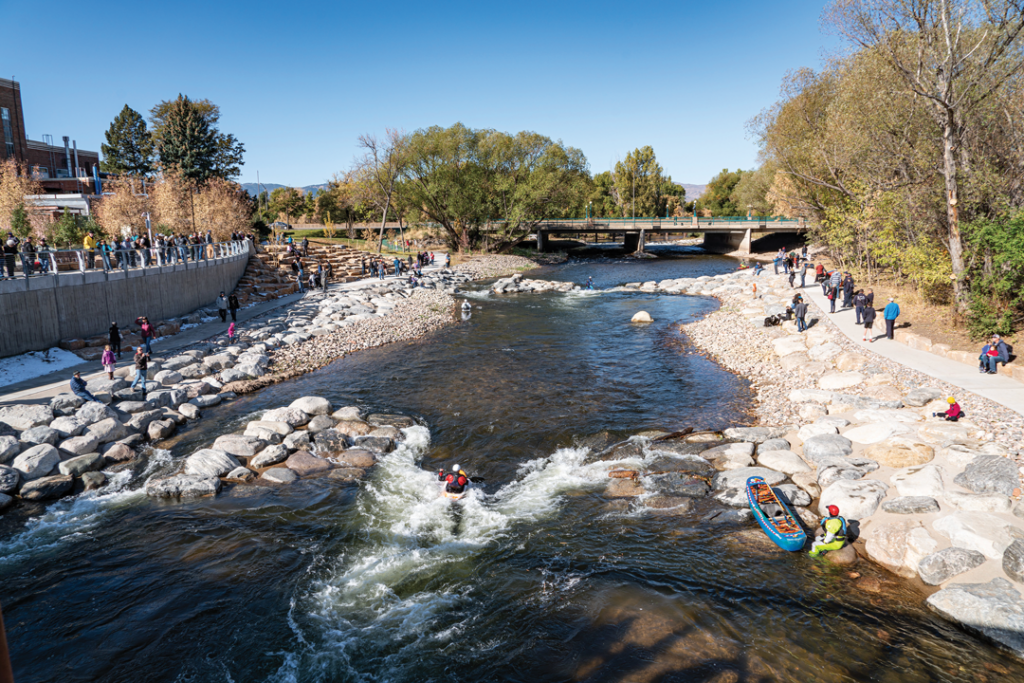
Poudre River Whitewater Park, Fort Collins.
Joining the club
Day says that starting Fort Collins’ Poudre River Whitewater Park was more like cleaning up an abandoned industrial park, one that would’ve made a great set for a new “Mad Max” movie. There was, as Day says, “100 years of trash.”
“It was not spring cleaning,” he says.
But after dredging and digging and moving literal tons of concrete in addition to cleaning, Fort Collins was happy to join the many other Colorado towns and cities that have made their rivers a place for residents to relax and recreate. Day says Fort Collins and other cities have done a good job of balancing the diverse needs.
“Everyone is passionate about the river, and they are all across the spectrum,” he says. “Some want to preserve, and some want X Games and massive events. That’s what’s nice about Fort Collins: You won’t make everyone happy, but you can recognize that there’s a wide range for how people want to engage with the river.”
Poudre River Whitewater Park is located just north of Old Town at 202 E. Vine Drive. Currently, the city plans to improve the stretch of the river that flows from Mulberry Street to Shields Street, but there are no solidified plans to revamp the entire river right away. Funding is an issue, and balancing recreation and the city’s other needs from the Poudre—a major one being that it’s a source of water—remains tricky. Those needs also change at different parts of the river, Day says.
Poudre River Whitewater Park offers so much recreation that interacting with it for the entire three-mile stretch isn’t necessary. But it still needs some work, even in the natural areas where a hands-off approach is encouraged.
“As you move farther away from the park, it can become more of a natural experience,” Day says. “The idea was to create some areas where you can engage with it, but we want to respect the river in other areas.”
Day hopes the whitewater park will look more natural as it matures.
“I’m hoping as the vegetation grows it has less of a hardened feel to it,” he says. “Mother Nature is humbling, but I’m hoping this restoration brings it into a new light.”
Know Before You Go
To check for river park closures and conditions, visit these websites:


